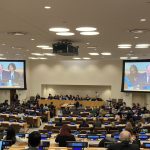
Photo: JC McIlwaine/UNICEF
The Annual Session of the Executive Board of the UN Children’s Fund (UNICEF) took place in New York on June 13th, 14th, and 15th, 2023.
During this session, UNICEF provided an update on the progress made in its various actions. Alongside the review of eleven draft decisions, the agenda included numerous reports and evaluations. This encompassed an annual report on humanitarian action and updates on UNICEF’s efforts to combat sexual exploitation and abuse. The session also addressed the new country programme document for Chile and the extension of ongoing country programmes. Additionally, an important focus was placed on the first report on the annual implementation of the UNICEF Gender Action Plan, 2022–2025, and the evaluation of UNICEF’s response to the COVID-19 pandemic.
Over the course of the three days, several countries expressed their concerns about the ongoing crises affecting children. Despite the efforts of UNICEF, the results thus far have been insufficient. Executive Director Catherine Russell acknowledged this in her opening statement, highlighting worrisome statistics. These included a fifteen percent increase, within just three years, in the number of children living in multidimensional poverty to 1.2 billion, 35 million children suffering from wasting, and nearly 14,000 children under the age of five dying each day due to preventable diseases.
Germany and Russia raised concerns about the lack of progress in achieving goals related to mental health, psychosocial support, and family policies. They emphasized the importance of supporting programs that prioritize the needs of families.
As part of the Annual Session, the NGO Committee on UNICEF submitted a written statement with various recommendations on behalf of its members. These recommendations were aligned with the majority of topics discussed during the session. They included measures related to education, mental health, investment in digital learning, child protection services, parenting programs, and climate change. The NGO Committee on UNICEF, representing civil society, called for tangible changes to ensure a brighter future for children.
The session concluded with discussions on the implementation of the World Bank Instrument and private fundraising, including the presentation of financial reports. Finally, the President of the Executive Board officially closed the Annual Session.






